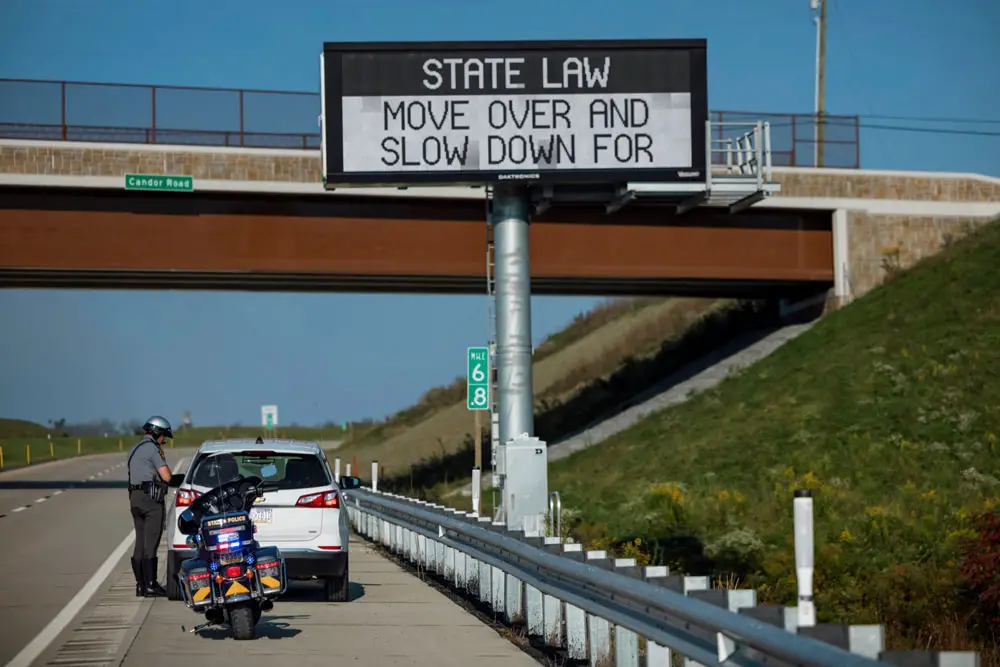 HARRISBURG, Pa. – The Pennsylvania Department of Transportation (PennDOT), Pennsylvania Turnpike Commission (PTC), and the Pennsylvania State Police (PSP) reminded motorists to move over or slow down on “National Move Over Awareness” Day.
HARRISBURG, Pa. – The Pennsylvania Department of Transportation (PennDOT), Pennsylvania Turnpike Commission (PTC), and the Pennsylvania State Police (PSP) reminded motorists to move over or slow down on “National Move Over Awareness” Day.
The day highlighted the importance of safe driving through emergency response areas and is observed on the third Saturday of October each year.
Pennsylvania’s Move Over Law requires drivers approaching an emergency response area who are unable to safely merge into a lane farther away from the response area to “pass the emergency response area at a speed of no more than 20 miles per hour less than the posted speed limit and reasonable for safely passing.” An emergency response area is where an emergency vehicle has its lights flashing, or where road crews or emergency responders have lighted flares, posted signs, or try to warn travelers.
“Safety is PennDOT’s most important priority for all of our road users,” said PennDOT Secretary Yassmin Gramian. “This includes our emergency responders. Failure to move over or slow down puts their lives at risk and even one life lost on Pennsylvania’s roadways is one too many. We urge motorists to always pay attention and follow the speed limit when driving, but especially in an emergency response area.”
“Injuries or deaths caused by a driver’s failure to move over or slow down near an emergency response area are 100 percent preventable,” said Colonel Robert Evanchick, Commissioner of the Pennsylvania State Police. “All citizens and residents of the commonwealth are asked to make a personal pledge to always move over and slow down to make Pennsylvania roadways safer for everyone.”
“National Move Over Awareness Day is a critical reminder that roadway workers and emergency responders are doing their jobs mere inches from live traffic,” said PA Turnpike COO Craig Shuey. “When motorists see a digital alert sign on the roadway, that could mean there is a temporary work area just ahead. These mobile work zones can pop up on the road at any time. You could also see a responder assisting a motorist along the roadway. This, too, is a trigger to move over to the left lane as soon as it’s safe to do so. Distracted drivers miss these advance warning signs, crash into construction vehicles, or, tragically, do harm to themselves or others.”
Drivers must move over or slow down for all responders, including police, fire, and ambulance crews, as well as stopped tow trucks and maintenance vehicles. The Move Over Law also mandates drivers change lanes or slow down when approaching disabled vehicles when at least two emergency displays, such as vehicle hazard lamps, road flares, and/or cones or caution signs are present.
Additionally, a similar regulation requires motorists to move over or slow down when approaching a stationary trash or recycling truck.
Failure to move over or slow down will result in a citation that carries a fine of $500 for first-time offenders, $1,000 for a second offense, and $2,000 and a 90-day license suspension for a third or subsequent offense. Penalties are increased for incidents that seriously injure or kill another person.
On average in the United States, two emergency responders are struck daily while working along the roadway. These incidents cause property damage, injuries, and in some cases fatalities.
In Pennsylvania, 152 emergency responders have been struck and killed while assisting on Pennsylvania roadways.
For more information on Pennsylvania’s Move Over Law, visit www.PennDOT.gov/Safety.
For more information on the Pennsylvania Turnpike Commission, visit www.PATurnpike.com.
For more information on the Pennsylvania State Police, visit psp.pa.gov.
Copyright © 2024 EYT Media Group, Inc. All rights reserved. Any copying, redistribution or retransmission of the contents of this service without the express written consent of EYT Media Group, Inc. is expressly prohibited.









